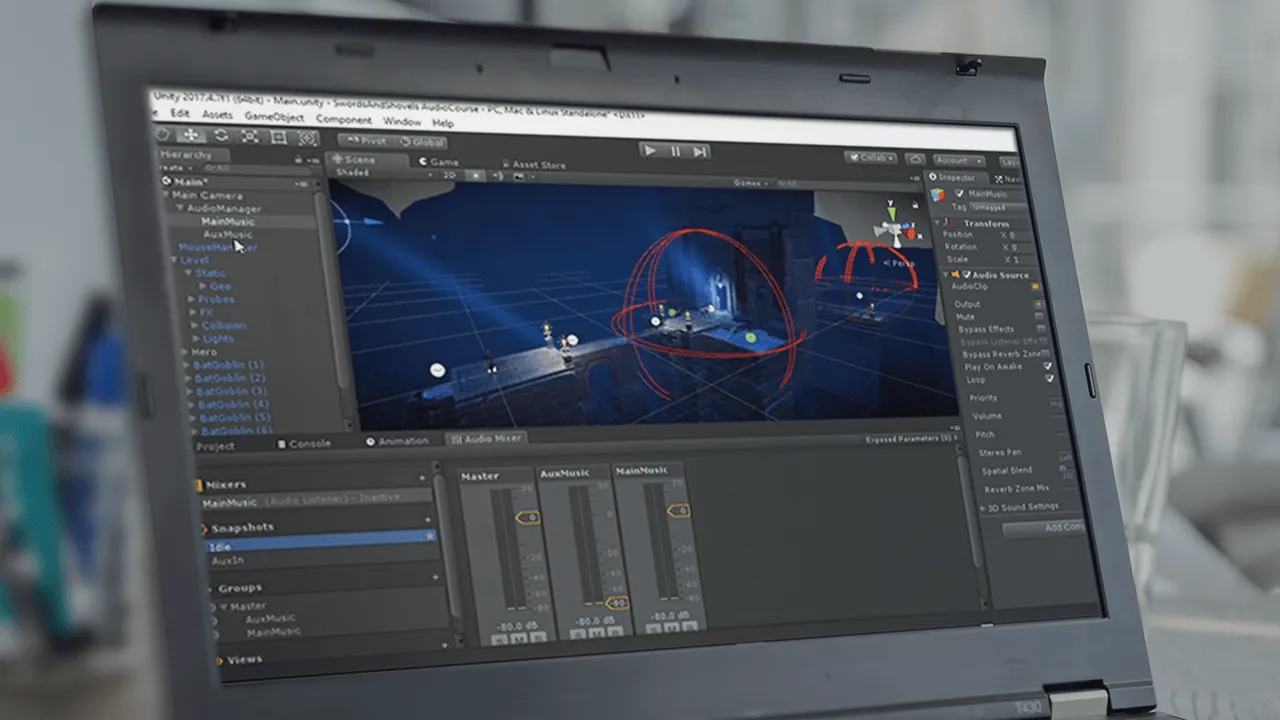
Unity Audio Fundamentals 
This course provides an introduction to Unity's audio engine, C# scripting for audio, and creating soundscapes for Unity projects. It is designed to equip Unity developers with the fundamentals of audio in Unity. ▼
ADVERTISEMENT
Course Feature
![]() Cost:
Cost:
Free Trial
![]() Provider:
Provider:
Pluralsight
![]() Certificate:
Certificate:
Paid Certification
![]() Language:
Language:
English
![]() Start Date:
Start Date:
On-Demand
Course Overview
❗The content presented here is sourced directly from Pluralsight platform. For comprehensive course details, including enrollment information, simply click on the 'Go to class' link on our website.
Updated in [March 06th, 2023]
Unity Audio Fundamentals is a course designed to introduce Unity developers to the basics of Unity's audio engine, C# scripting for audio, and creating compelling soundscapes for their Unity project. This course covers topics such as playing background music, playing ambient sound, creating event-triggered sound effects (SFX) in Unity, multi-track background music, Unity's Audio Mixer component, creating a Music Controller script in Unity, and polishing soundscapes with audio FX. By the end of this course, learners will understand how to play and control dynamic multi-track background music, add sound effects and trigger them with C# code, utilize Unity's many built-in audio effects, and mix it all together using Unity's convenient Audio Mixer. Software required for this course is Unity 5 or newer, and Visual Studio.
[Applications]
Upon completion of Unity Audio Fundamentals, users will have the knowledge to create compelling soundscapes for their Unity projects. They will be able to play and control dynamic multi-track background music, add sound effects and trigger them with C# code, utilize Unity's many built-in audio effects, and mix it all together using Unity's convenient Audio Mixer.
[Career Paths]
1. Audio Engineer: Audio engineers are responsible for recording, mixing, and mastering audio for a variety of projects, including music, film, television, and video games. They use a variety of tools and techniques to create the desired sound. Audio engineers must have a strong understanding of audio technology and be able to work with a variety of audio software. The demand for audio engineers is growing as the entertainment industry continues to expand.
2. Audio Programmer: Audio programmers are responsible for creating and implementing audio systems for video games and other interactive media. They must have a strong understanding of audio technology and be able to write code to create sound effects, music, and other audio elements. Audio programmers must also be able to work with a variety of audio software and tools.
3. Sound Designer: Sound designers are responsible for creating sound effects and music for video games and other interactive media. They must have a strong understanding of audio technology and be able to create sound effects and music that are appropriate for the project. Sound designers must also be able to work with a variety of audio software and tools.
4. Music Producer: Music producers are responsible for producing music for a variety of projects, including music, film, television, and video games. They must have a strong understanding of audio technology and be able to work with a variety of audio software and tools. Music producers must also be able to work with a variety of musicians and artists to create the desired sound. The demand for music producers is growing as the entertainment industry continues to expand.
[Education Paths]
1. Bachelor of Science in Audio Engineering: This degree program focuses on the technical aspects of audio engineering, such as sound recording, mixing, and mastering. Students learn how to use audio software and hardware to create professional-quality audio recordings. They also learn about the physics of sound and the principles of acoustics. This degree is becoming increasingly popular as the demand for audio engineers grows.
2. Bachelor of Music in Music Production: This degree program focuses on the creative aspects of music production, such as composition, arrangement, and production. Students learn how to use music software and hardware to create professional-quality music recordings. They also learn about the history of music production and the principles of music theory. This degree is becoming increasingly popular as the demand for music producers grows.
3. Master of Science in Audio Technology: This degree program focuses on the advanced aspects of audio technology, such as signal processing, digital audio workstations, and audio programming. Students learn how to use audio software and hardware to create professional-quality audio recordings. They also learn about the physics of sound and the principles of acoustics. This degree is becoming increasingly popular as the demand for audio engineers grows.
4. Master of Music in Music Technology: This degree program focuses on the advanced aspects of music technology, such as digital audio workstations, audio programming, and sound design. Students learn how to use music software and hardware to create professional-quality music recordings. They also learn about the history of music production and the principles of music theory. This degree is becoming increasingly popular as the demand for music producers grows.
Course Provider

Provider Pluralsight's Stats at AZClass
Pluralsight ranked 16th on the Best Medium Workplaces List.
Pluralsight ranked 20th on the Forbes Cloud 100 list of the top 100 private cloud companies in the world.
Pluralsight Ranked on the Best Workplaces for Women List for the second consecutive year.
AZ Class hope that this free trial Pluralsight course can help your Unity skills no matter in career or in further education. Even if you are only slightly interested, you can take Unity Audio Fundamentals course with confidence!
Discussion and Reviews
0.0 (Based on 0 reviews)
Explore Similar Online Courses

Sociological Perspectives on Modernity

Mastering Concurrency in Go

Python for Informatics: Exploring Information

Social Network Analysis

Introduction to Systematic Review and Meta-Analysis

The Analytics Edge

DCO042 - Python For Informatics

Causal Diagrams: Draw Your Assumptions Before Your Conclusions

Whole genome sequencing of bacterial genomes - tools and applications

Learn Unity 3D and C# By Making a Full Game (2023)

Asset Creation and Management


Start your review of Unity Audio Fundamentals